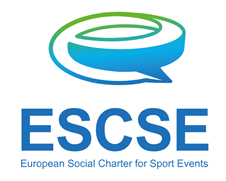Sport events, especially when they are of a global scale, have
been facing more and more questions about their impact on local
communities, the environment, and human rights.
It has become clear that their social legitimacy is not a
given, but must be earned by showing that sport events can positively
contribute to society. During this half-day conference, we will debate
the proposal of a European Social Charter for Sport Events in order to
achieve this goal.
In January 2021, a consortium of eight partners launched a
three-year project, supported by the European Commission under the
Erasmus+ scheme, aimed at devising a European Social Charter for Sport
Events (ESCSE). The project ambitions to develop a Charter which will
contribute to ensuring that sport events taking place in the European
Union are socially beneficial to the local communities concerned and,
more generally, to those affected by them. The project is directly
inspired by the decision of the Paris 2024 bid to commit to a social
charter enforced throughout the preparation and the course of the 2024
Olympics.
This first public event in the framework of the ESCSE project,
will be introducing the project to a wider public. During the event we
will review the current state of the implementation of the Paris 2024
Social Charter, discuss the expectations of stakeholders and academics
for a European Social Charter and present for feedback the first draft
of the ESCSE (and its implementing guidelines) developed by the project
members. It will be a participatory event; we welcome input from the
participants.
The Asser International Sports Law Centre, powered by the Asser
Institute, is contributing to the project through the drafting of a
background study, which we will introduce during the conference.
Please note that we can
provide some financial support (up to 100 euros) towards travel
and/or accommodation costs for a limited number of participants
coming from other EU Member States or the UK. To apply for this
financial support please reach out to ConferenceManager@asser.nl. `
Register HERE

